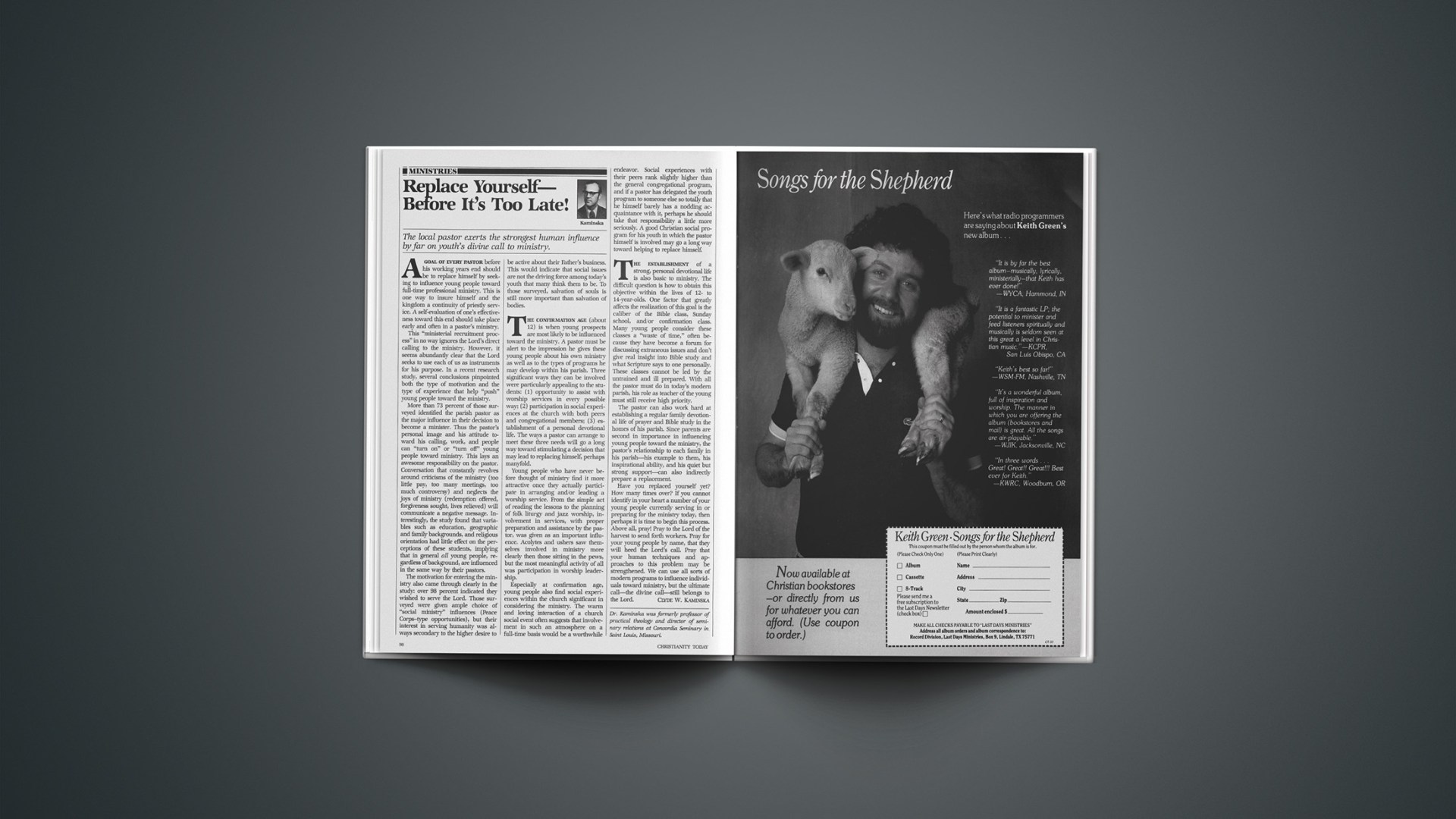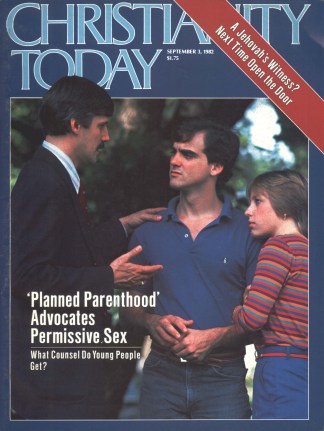The local pastor exerts the strongest human influence by far on youth’s divine call to ministry.
A goal of every pastor before his working years end should be to replace himself by seeking to influence young people toward full-time professional ministry. This is one way to insure himself and the kingdom a continuity of priestly service. A self-evaluation of one’s effectiveness toward this end should take place early and often in a pastor’s ministry.
This “ministerial recruitment process” in no way ignores the Lord’s direct calling to the ministry. However, it seems abundantly clear that the Lord seeks to use each of us as instruments for his purpose. In a recent research study, several conclusions pinpointed both the type of motivation and the type of experience that help “push” young people toward the ministry.
More than 73 percent of those surveyed identified the parish pastor as the major influence in their decision to become a minister. Thus the pastor’s personal image and his attitude toward his calling, work, and people can “turn on” or “turn off” young people toward ministry. This lays an awesome responsibility on the pastor. Conversation that constantly revolves around criticisms of the ministry (too little pay, too many meetings, too much controversy) and neglects the joys of ministry (redemption offered, forgiveness sought, lives relieved) will communicate a negative message. Interestingly, the study found that variables such as education, geographic and family backgrounds, and religious orientation had little effect on the perceptions of these students, implying that in general all young people, regardless of background, are influenced in the same way by their pastors.
The motivation for entering the ministry also came through clearly in the study: over 98 percent indicated they wished to serve the Lord. Those surveyed were given ample choice of “social ministry” influences (Peace Corps-type opportunities), but their interest in serving humanity was always secondary to the higher desire to be active about their Father’s business. This would indicate that social issues are not the driving force among today’s youth that many think them to be. To those surveyed, salvation of souls is still more important than salvation of bodies.
The confirmation age (about 12) is when young prospects are most likely to be influenced toward the ministry. A pastor must be alert to the impression he gives these young people about his own ministry as well as to the types of programs he may develop within his parish. Three significant ways they can be involved were particularly appealing to the students: (1) opportunity to assist with worship services in every possible way; (2) participation in social experiences at the church with both peers and congregational members; (3) establishment of a personal devotional life. The ways a pastor can arrange to meet these three needs will go a long way toward stimulating a decision that may lead to replacing himself, perhaps manyfold.
Young people who have never before thought of ministry find it more attractive once they actually participate in arranging and/or leading a worship service. From the simple act of reading the lessons to the planning of folk liturgy and jazz worship, involvement in services, with proper preparation and assistance by the pastor, was given as an important influence. Acolytes and ushers saw themselves involved in ministry more clearly then those sitting in the pews, but the most meaningful activity of all was participation in worship leadership.
Especially at confirmation age, young people also find social experiences within the church significant in considering the ministry. The warm and loving interaction of a church social event often suggests that involvement in such an atmosphere on a full-time basis would be a worthwhile endeavor. Social experiences with their peers rank slightly higher than the general congregational program, and if a pastor has delegated the youth program to someone else so totally that he himself barely has a nodding acquaintance with it, perhaps he should take that responsibility a little more seriously. A good Christian social program for his youth in which the pastor himself is involved may go a long way toward helping to replace himself.
The establishment of a strong, personal devotional life is also basic to ministry. The difficult question is how to obtain this objective within the lives of 12- to 14-year-olds. One factor that greatly affects the realization of this goal is the caliber of the Bible class, Sunday school, and/or confirmation class. Many young people consider these classes a “waste of time,” often because they have become a forum for discussing extraneous issues and don’t give real insight into Bible study and what Scripture says to one personally. These classes cannot be led by the untrained and ill prepared. With all the pastor must do in today’s modern parish, his role as teacher of the young must still receive high priority.
The pastor can also work hard at establishing a regular family devotional life of prayer and Bible study in the homes of his parish. Since parents are second in importance in influencing young people toward the ministry, the pastor’s relationship to each family in his parish—his example to them, his inspirational ability, and his quiet but strong support—can also indirectly prepare a replacement.
Have you replaced yourself yet? How many times over? If you cannot identify in your heart a number of your young people currently serving in or preparing for the ministry today, then perhaps it is time to begin this process. Above all, pray! Pray to the Lord of the harvest to send forth workers. Pray for your young people by name, that they will heed the Lord’s call. Pray that your human techniques and approaches to this problem may be strengthened. We can use all sorts of modern programs to influence individuals toward ministry, but the ultimate call—the divine call—still belongs to the Lord.
Dr. Kaminska was formerly professor of practical theology and director of seminary relations at Concordia Seminary in Saint Louis, Missouri.









